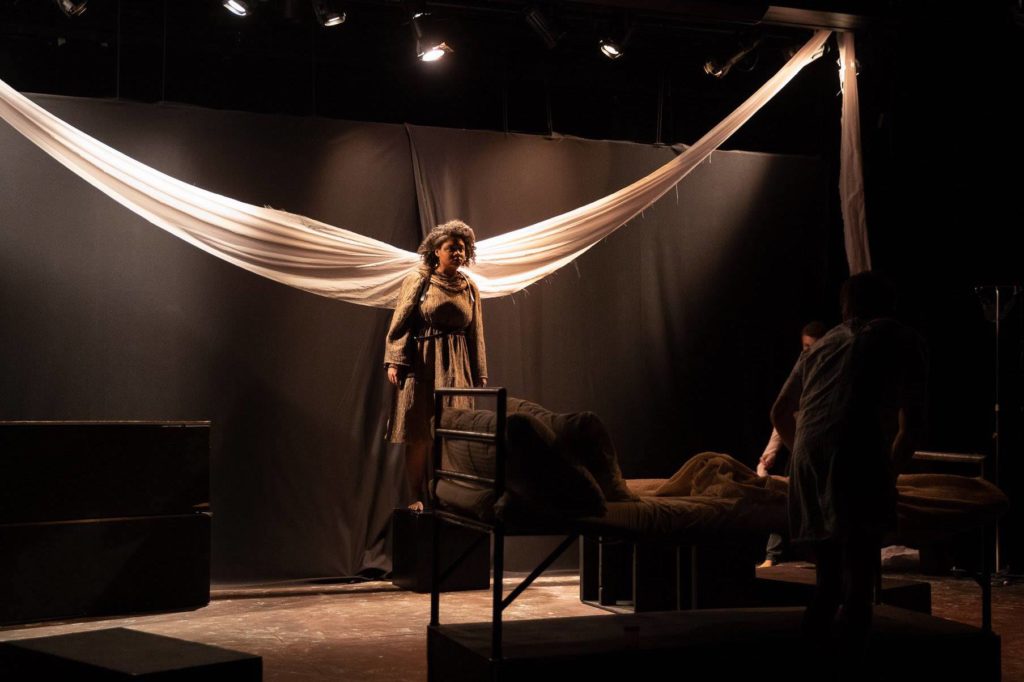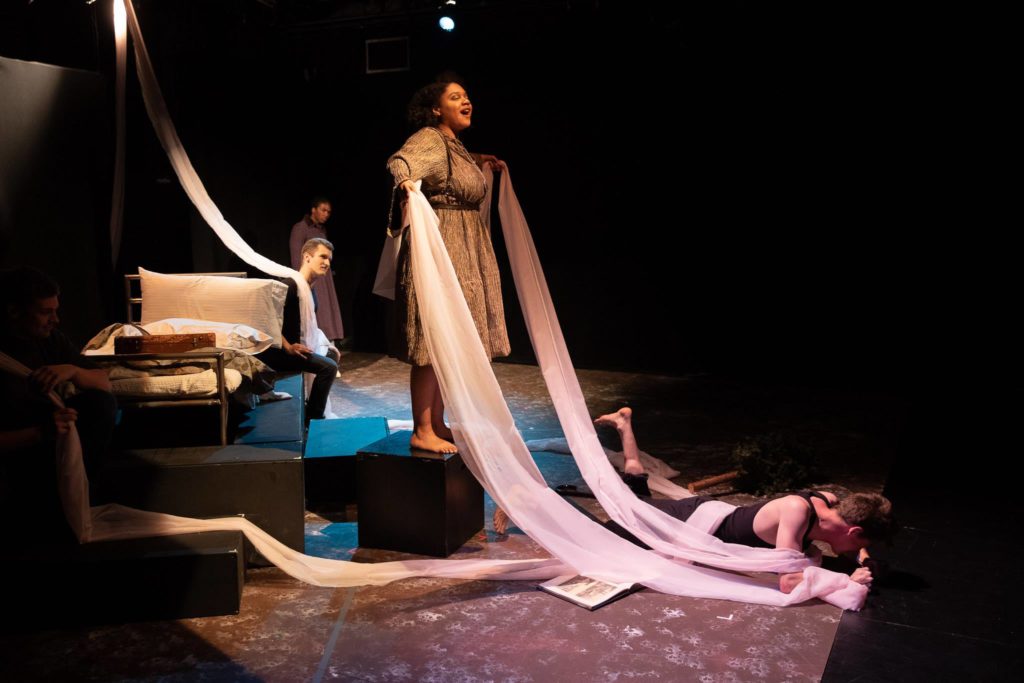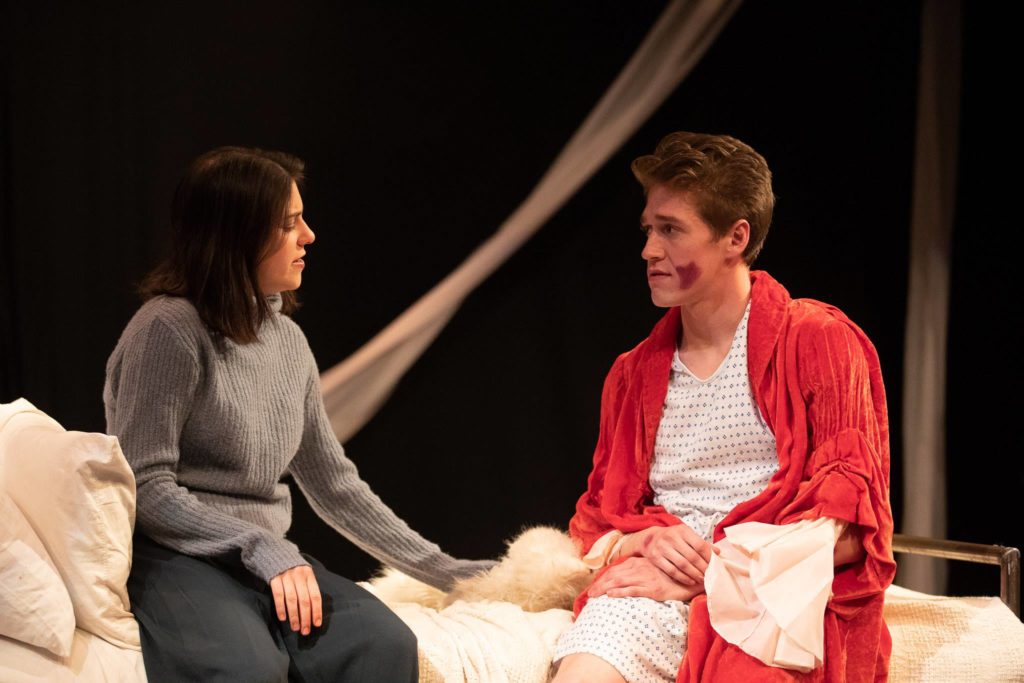
There are two kinds of plays. The first kind is easy to stage; these plays just work, even if the production is lackluster. They don’t require inventive directing, precise design choices, or inspired acting – they merely ask for competence, not brilliance.
Angels in America: Perestroika is one of the other kind. This is a monstrously difficult play that offers unbelievable depth and scope if a creative team can rise to the challenge of the script, and while Stanford Theater Lab’s production occasionally stumbles, it also soars to a mythic level that is far too rare in Stanford theater.
This is the second installment in Tony Kushner’s 1993 masterpiece; last year, we saw Angels in America: Millennium Approaches with a similar but not identical cast and crew. Perestroika picks up where we left off: Prior Walter has just had a vision of an Angel bursting through his ceiling and anointing him as a prophet – which his friend Belize, a nurse, naturally thinks is a hallucination and analyzes as a subconscious reference to Louis, Prior’s former lover who left him upon realizing Prior had AIDS. Meanwhile, Roy Cohn, a closeted gay man and notorious McCarthyist lawyer, is in the hospital under Belize’s care; he, too, is seeing things, only his visions take the form of visitations by Ethel Rosenberg, whom he prosecuted in her espionage trial. The sole living person who visits Roy is Joe Pitt, a closeted Mormon who, at the end of Millennium Approaches, had left his wife, Harper, and gone home with Louis; neither Harper nor Joe’s mother, Hannah, know where he is. A full synopsis would be both excessively long and full of spoilers; I recommend, instead, that you see the show. The very short synopsis is that each of these characters is torn, repeatedly: between connection and fear, between love and safety, between faith and skepticism.
From the number of characters alone, it’s clear that this is a massive play; adding to that challenge, the play steadfastly refuses to explain what is fantasy and what is reality. Almost every supernatural scene, from angelic visitations to mannequin reanimations, can be explained as some kind of dream or hallucination, and yet some characters seem to know things that they could only have learned through those dreams. Vineet Gupta’s (’18) staging is largely successful in the almost impossible task of mixing these two worlds without letting them become one and the same. Through an elegant set and costume design executed by Allen Wehner (’20) and Charlie O’Donohue (’21) respectively, the Angel’s wings extend into the stage when needed, but hang over the stage even when she is nowhere to be seen. The soundscape of the play, designed by Jamie Tippett (’19) also aids in this delicate balancing act, adding just the right amount of unearthly music and bone-rattling bass to settle us into a spiritual world.

These more supernatural scenes are beautifully worked-out; the Angel, Alexa Luckey (’20), commands the stage with an almost dance-like manner, reinforced by some well-executed audio amplification. In some of the longer scenes, however, the blocking becomes almost painfully static – sometimes an entire monologue is delivered and received without a single motion. A similar lack of detail work shows up in the scene transitions, where actors often seemed compelled to simply exit the stage as quickly as possible, without any kind of internal justification.
In all honesty, this lack of motivated exits might have been less obvious if this production had not been so well-acted. Jake Goldstein (’19) as Prior Walter is tortured, funny, earnest, and cynical; I don’t think there is higher praise than to say he is believable, moment to moment, in one of the best male roles of the past twenty-five years. Maya Caulfield (’21), as Hannah Pitt, is iron-hard and firm in her faith, which makes her unexpected softness towards Prior all the more wonderful. Ali Rosenthal (’20) delivers an extraordinary performance as Harper: she sends a kind of raw pathos into the air as she speaks, untempered by her moments of startling humor.

On the opposite end of the “audience sympathy” spectrum, Noah Bennett (’19) played Roy Cohn with an exuberant cruelty that is both horrifying and entertaining. When Roy manages to goad Belize, portrayed with a resigned sense of humor by Ra Bacchus (’19), into calling him a racial slur, the moment between them is electric. And Roy’s other opposite, the deceased Ethel Rosenberg (Lexi Stein (’19)), is at turns cruel and gentle, a fully realized human; her brief moment of kindness for Roy, singing for him when he seems to think she is his mother, is one of the most affecting notes in the show.
That kindness, more than anything else, remained in my head and my heart long after I left the Nitery. It reminded me of Ari Mahler, the nurse that cared for Robert Bowers, minutes after Bowers killed eleven people in a synagogue. In a public post a few days later, Mahler wrote, “I chose to show him empathy… Love as an action is more powerful than words, and love in the face of evil gives others hope. It demonstrates humanity.” This country is full of evil – that is clear. And it is full of love, and hope, and humanity – that is also clear.
The Great Work continues.
Angels in America: Perestroika ran November 8-11 in the Nitery.
Images courtesy of Frank Chen (’14).
